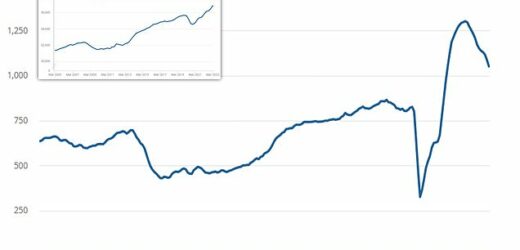Boost for Britain as employment hits new record high despite stuttering economy with inactivity rates finally falling after Covid – but wages are STILL not keeping up with inflation
- Jobless rate falls to 3.8% in three months to April from 3.9% in previous quarter
- Most economists had been expecting the unemployment rate to edge up to 4%
Britain’s unemployment rate fell unexpectedly today as the number of people in work hit a new record high and rose past its pre-pandemic level for the first time.
The Office for National Statistics (ONS) revealed that the UK jobless rate fell to 3.8 per cent in the three months to April from 3.9 per cent in the previous quarter.
Most economists were expecting the unemployment rate to edge up to 4 per cent. The ONS said the health and social care sector was the biggest driver in jobs growth.
Statisticians added that the UK’s employment rate rose to 76 per cent in the latest quarter, edging up from 75.9 per cent in the previous three months.
They also said the number of people in jobs hit at an all-time high of 33.1 million, up 250,000 quarter on quarter as more Britons returned to the jobs market. This was above a Reuters poll forecast for a 162,000 increase.
Employment has reached a new record high after finally overtaking the levels from before Covid in the latest ONS figures
Wages are still falling compared to soaring CPI inflation, even though pay is increasing at historically very fast rates
Long-term sickness has continued to rise since Covid, despite the overall dip in inactivity rates
But there were also some worrying signs for the employment sector, with vacancies falling for the 11th time in a row and another record high for those off work due to long-term sickness.
READ MORE Average mortgage rates rise AGAIN towards 6% for a two-year fixed deal: More pain for homeowners as Britain braces for the ‘big reset’
And average weekly regular wages hit a record outside the skewed pandemic years, but remained down with inflation taken into account.
The ONS said wages excluding bonuses were 7.2 per cent higher than a year earlier during the three months to April. Economists polled by Reuters had forecast a 6.9 per cent rise on average.
Chancellor Jeremy Hunt said today: ‘The number of people in work has reached a record high, and the IMF and OECD recently credited our major reforms at the Budget which will help even more back into work while growing the economy.
‘But rising prices are continuing to eat into people’s pay cheques – so we must stick to our plan to halve inflation this year to boost living standards.’
April’s jobs data is the first to include the impact of a 9.7 per cent rise in the minimum wage, and will be closely analysed by the Bank of England as it tries to judge how lasting an effect Britain’s recent spell of double-digit inflation has had.
BoE officials are likely to note that the headline employment and wages data came in above all forecasts, while the unemployment rate was below all forecasts.
Financial markets ahead of today’s data had already priced in peak interest rates in excess of 5.5 per cent by December, from 4.5 per cent now.
VACANCIES BY SECTOR: The number of vacancies fell in the majority of industry sectors
COMPANY SIZES: All company size bands saw the number of vacancies fall on the quarter
Darren Morgan, director of economic statistics at the ONS, said: ‘With another rise in employment, the number of people in work overall has gone past its pre-pandemic level for the first time, setting a new record high, as have total hours worked.
‘The biggest driver in recent jobs growth, meanwhile, is health and social care, followed by hospitality.
‘While there has been another drop in the number of people neither working nor looking for work, which is now falling right across the age range, those outside the jobs market due to long-term sickness continues to rise, to a new record.
‘In cash terms, basic pay is now growing at its fastest since current records began, apart from the period when the figures were distorted by the pandemic. However, even so, wage rises continue to lag behind inflation.’
Shadow chancellor Rachel Reeves said: ‘Our country has enormous potential. We should be leading in the industries of the future and creating good jobs across Britain, but the Tories continue to hold us back.
TOTAL JOBS: The total number of jobs in March this year increased to a record 36.8million
JOBS GROWTH: Quarterly growth was seen across the majority of industries in March 2023
JOB VACANCIES: The estimated number of vacancies fell on the quarter to 1,051,000
‘Family finances are being squeezed to breaking point by a further fall in real wages, and record numbers of people are out of work due to long-term sickness.’
And Ben Harrison, Director of the Work Foundation think tank at Lancaster University, said: ‘Today’s figures show the UK employment rate is at a record high, but they also point to underlying weakness that are hampering growth and living standards.
‘Even with vacancies falling for the eleventh consecutive month and economic inactivity dropping, employers are still facing worker shortages. Despite strong public and private wage growth, inflation has resulted in workers being on average 1.3 per cent poorer on the year.
‘With a record 2.55 million long-term sick, the UK is the worst performer in the G7 for workforce participation since the start of the pandemic. Yet nearly one in four people who are long-term sick want to work.’
Source: Read Full Article











